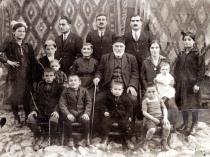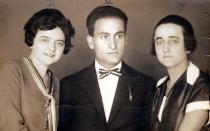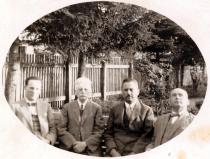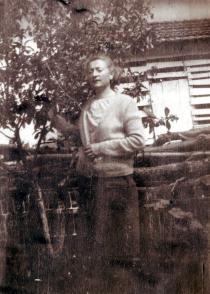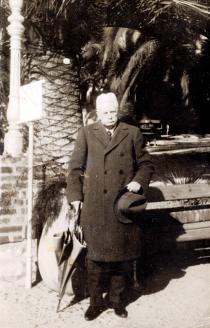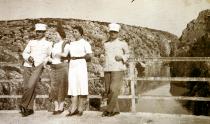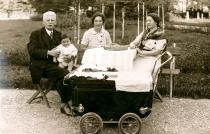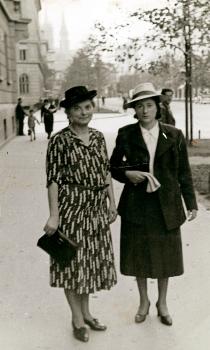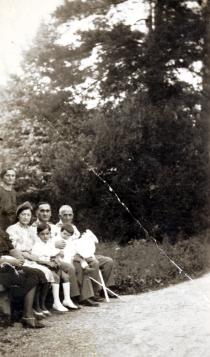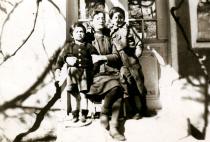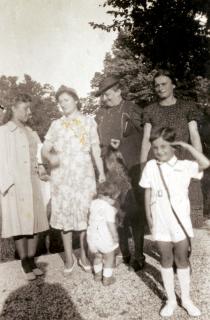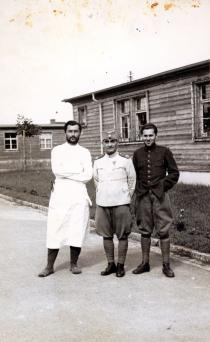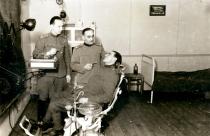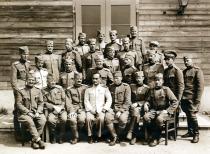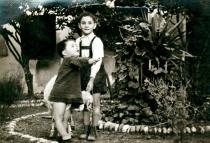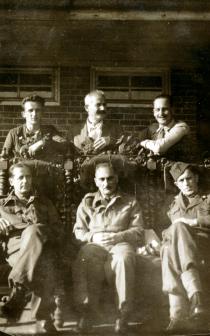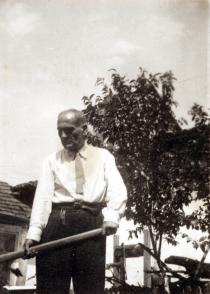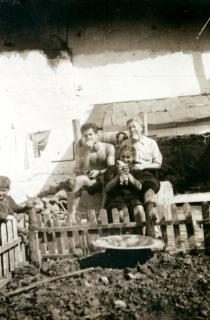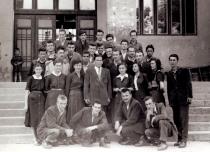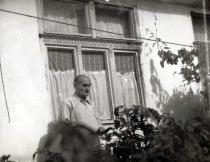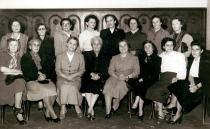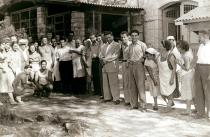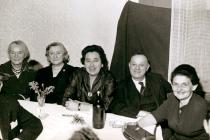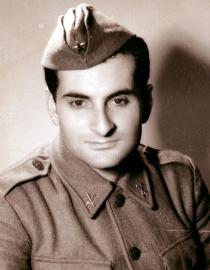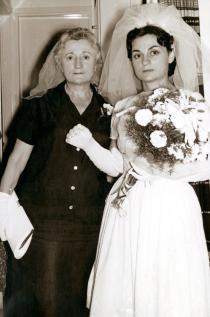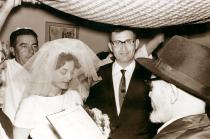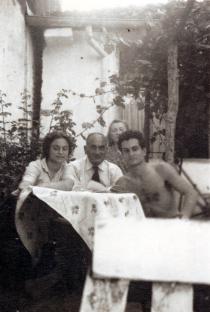
Josef Baruhovic
Interviewer: Rachel Chanin
My family background
My family was a typical assimilated Jewish family for this part of the world. Life and circumstances moved us from place to place, but even today I remain a typical assimilated Jew. I am called Josef (Juski) Baruhovic and I was born on December 21, 1934. My mother and father lived in Pristina, where my father's family was from. However, my mother wanted to be surrounded by her family for my birth, so I came into this world in Sarajevo.
My mati, as we called my mother, Simha (Sida) Baruhovic (maiden name- Izrael), was born in 1906 to a large Sarajevan family. She had three brothers and three sisters, and they all lived comfortably in Sarajevo, where my grandfather, Josef Izrael, made a good living off the shares he owned in various companies.
He indulged his children and catered to their interests. For instance, he sent my mother to Vienna for voice lessons when she was a young woman. She had a wonderful voice and she tried to encourageus to appreciate music as much as she did.
My grandfather was a very smart and capable man; he had been a supplier to the Austro-Hungarian army, and then he lived off his investments. His health was bad, though, and to avoid problems, he spent winters in a hotel in Herceg Novi, on the Adriatic coast. He died in 1935 in Mostar at my mother's sister Erna'shouse.
His body was transported back to Sarajevo where he was buried. He was lucky to have died in bed and not in a gas chamber, as was the fate of many of my family members and so many other Jews here.
When he and my grandmother, Rahela Izrael (maiden name - Salom), married, she brought a large dowry to the marriage. In those days, marriage was more of an obligation and social merger than a question of love. People married partners who would improve their social standing, and the matchmaker was the one who made those arrangements. The Jews had their matchmakers, whowere usually quite talkative and skilled women, whose job it was to seekout the right person.
There were Serbian, Turkish, and Muslim matchmakers, and each one matched pairs from within their religious group-intermarriagewas unheard of at the time and certainly not the job of the matchmaker. A family got the word out that they were looking to marry off a child, the other families did the same, and the matchmaker connected the two.
It was important that they both be from similar financial backgrounds and that Jews married Jews. The last step of the process was for the two young people to meet each other. It was almost a blind process for them. The goal was always a good and reasonable match. The matchmaker was of course compensated with a "gift."
My father's family was of lower social standing than my mother's. They were small-scale merchants in Pristina, where they owned a small family-run shop. My grandfather knew how to read and write and his shop they wrote in Hebrew letters and spoke Ladino. My father's family was mainly looked after by my Vava (Pristina Ladino for grandmother), Rahela Baruh (maiden name -Simon).
My grandfather, Mose Baruh, liked to drink and did not make too much of an effort to look after his large family. Those responsibilities fell on my Vava. Looking back, it seems to me that the women in my family were much more capable than the men, starting with my Vava, then my mother,and now my sister. Otherwise the Baruhs were a typical Pristina Sephardic family--traditional in their religious observances and modest in their means.
My father, Haim (or Mika) Baruh was born in Pristina in 1898. He studied medicine and dentistry in Zagreb and in Prague. When he finished his studies he enlisted in the military and became an active officer. When he joined the military he Serbianized his name. He was not compelled to make this change but felt it would help his career and make life lesscomplicated.
My father knew how to read Hebrew but he did not understand it. He learned Hebrew in school in Pristina with Rabbi Levi. At that time, Jewish youth were obligated to go to Jewish school for at least a year or two to learn how to read and write Hebrew. My mother could also read Hebrew, which was unusual for women of her generation.
In Pristina and Sarajevo all the Sephardi Jews spoke Ladino. My parents spoke both Serbian and Ladino at home. When they wanted to hide something from us they would speak Ladino. But we knew Ladino and understood what they said. Today my sister and her husband try the same trick on their children. When they do not want their children to understandthey speak in Spanish and the rest of the time in Hebrew.
Growing up
Trying to recall our religious practices before the war is like looking back through a thick fog and we really weren't very observant. We did go to synagogue on occasion, and the first time I even saw an Ashkenazi servive was in the synagogue in Zagreb in 1936, when we moved there. That's where my father had been transferred to and my sister, Rahela (Seli or Selika, as I call her), was born there in 1939.
Since my father was an officer, we also had many military people around our house helping us. My father even had a car and a chauffeur to drive him. As an officer, my father, in general, socialized with other officers. My mother generally socialized with Jews in Zagreb.
During the war
In the early 1940s, a huge number of jews Jews from Germany and Austria sought refuge inthe Kingdom of Yugoslavia. Every Jewish family was expected to take in at least one of these families. We had a big apartment and good conditions, and we took in a couple from Germany. They were in such terrible straits -- they had no one, nothing, and they were running.
While they were with us, we talked a lot (my mother knew German from her studies in Vienna) and they warned us about what lay ahead and told us we needed to run. My father did not want to listen. He would say, "I was born here. Why do I need to hide, to run?"
In 1941 much of what the young couple told us came true, but a month or two before the war began, my mother, sister and I moved from Zagreb to Sarajevo. She believed that young German couple and wanted to be with her family. And I must say this: my mother had an instinct for danger that, over the next three years, never deserted her, and it saved our life more times than I can count.
The German invasion came in April 1941; it lasted a short time, only two or three weeks and the Yugoslav army capitulated. My father was taken prisoner as an officer, which we only found out later.
At the beginning we stayed with my mother's sister, Esperanza, in the center of Sarajevo. From her apartment, near the large Cathedral, about 10 meters up the hill, I could see the Ustashe destroying and looting what was perhaps the most beautiful synagogue in the Balkans.
Aunt Esperanza was taken to the Jasenovac or Gradiska concentration camp where they murdered her. Once the Ustashe took over and the threat of danger increased, we left this apartment and moved in with another one of my mother's sisters who lived a bit further out of town.
They started issues sanctions against the Jews. First came the curfews, then we had to wear yellow badges in the shape of the letter Z (Zido = Jew). Commissars were entrusted to control Jewish property, basically to ensure that the Jews did not try to sell their property.
One of these commissars lived in my uncle's apartment. At this point, special police began picking people up on the streets, ten to twenty people a night, putting them into trucks and taking them to camps. Later, they began going from house to house.
We knew that there were camps, but we did not know what happened in them. We certainly did not know that they were death camps. Therefore, people did not look at the camps as such a tragic thing. We each had a small sack packed, with underwear, towels, a little food, some clothing so we were prepared should they come to take us.
One day my mother's sister, Aunt Erna, sent her Catholic Croatian servant from Mostar up to Sarajevo to bring me to Mostar ,where she and her husband lived. We travelled by train, and since I was so small, no one asked any questions. A week later my aunt sent a taxi to Sarajevo to pick up my mother and sister and bring them, too. Of course, she had to pay for these interventions. My aunt and uncle did a great mitzvah during the war. They saved and helped many Jews, and at one point there must have been twenty of us living with them. That is how wecame to Mostar, which was a relatively livable town under Italian control.The Italians were entirely different from the Ustashe, and their treatment of the Jews was much better and more humane. We had freedom to move around,and we did not have to wear the yellow Z.
My uncle, David Kohen, Erna's husband, was a religious man. Every Shabbat he read something but I do not remember what. Ironically, I had religious lessons during the war. While we lived there my uncle sent my sister, our cousins and me for private religious lessons with the rabbi two or three times a week, where we learned Hebrew, and about the holidays and history.
We lived with Aunt Erna and Uncle David for a year and a half until the idiotic evil Ustashe bandits took over from the Italians in September 1943. Since we knew what it meant to live under Ustashe control, we knew it was time to run. My father was from Pristina and since that region was still under Italian control my mother decided that should be our next destination. Aunt Erna and Aunt Blanka went to an Italian camp where they were treated correctly and eventually joined the partisans. Uncle David stayed behind, and he was killed in Mostar.
Uncle David had been a friend of the Italian Consul, a philatelist. David gave him German marks, which were very valuable at the time, in return for a letter granting my mother, sister and me permission to pass through all check points on the way to Pristina. My mother guarded that letter with her life. Literally. We went from Mostar to Dubrovnik, from Dubrovnik by ship to a port in Albania, and from the Albanian port by bus or some other transport to Pristina. The entire way we were so worried that there would be mines orother obstacles on the roads.
My father's family was still there in Pristina in mid-1943 and things were relatively quiet. When we arrived we stayed at one of the two houses that my parents owned. However, very soon the Italians begancapitulating, and once again my mother understood that we needed to flee from the incoming Germans, who were only days away.
Now we hurried back into Albania, but before leaving Pristina my mother sold one of our houses so we would have money to live off of. Selling the house was a great production. Albanians can bevery honest and extremely strict, as my mother found out. My mother made a deal with an Albanian who gave her a deposit with the understanding that he would get the house when he paid the remainder.
A short while later, another Albanian appeared who was willing to pay more. My mother, like a shrewd businesswoman, decided to give it to the second buyer. When my mother tried to return the deposit to the first buyer he tried to kill her. She cried and complained and barely escaped with her life. He figured that since she was a woman, and women are not on the same level as men, he'd better let her go. In the end we sold the house and fled for Skadar, Albania.
Mother hired a taxi to drive us over the border to Skadar. There were still some Italians in command, so we went to the Italian police and they gave us the permission to stay. The Italian police simply didn't care.
In Albania we rented rooms in private houses that my mother paid for with the money she got from selling the house. A woman with two young children did not draw much interest or attention.
But then the Germans arrived even here and my mother sensed danger. We lived near a Catholic church and we all went to pray there, regularly, in a good Catholic style. Every Sunday they gave us a wafer and I chewed it—people were shocked – and my mother pulled me out and she couldn't accept that I wasn't going to school. She found a man selling fruit, so she got me a job working for him. To be honest, I had been happy doing nothing, but my mother wouldn't hear of it.
With the Germans now living near us, my mother moved us into the Muslim part of the town. She changed my name Yusef, she became Sahida, and my sister went from Rachel to Rachida.
This Turkish part of town was very closed off, very insulated. We lived in one room, there was no running water. We had a toilet outside. Everyone was poor, but nobody asked questions. We just said we are foreigners; we paid the rent.
Once again, my mother insisted I work and she got me a job with a carpenter. My job was to fix old nails. Every day, all day, straightening nails. My fingers became bloody. I told my mother I can't do it any more, and finally, in our neighborhood, she found a dentist, so I worked for him, cleaning everything.
Then the son of our landlord got married and they took our flat. This was toward the end of the war—we were thrown on the street—the Germans were on the hunt for people, and we kept asking from door to door, house to house. Finally, we got a flat just fifty meters from the German barracks, their military camp. Our landlord was an Albanian peasant, he traded in wheat, and he figured out who we were and he said to my mother that there was a room in his house where he was keeping the wheat, and we could move in just behind it.
With the Germans were quite a few Ukrainian workers. They were good workers, but they liked to drink. A few of us boys from the neighborhood went to the pub, bought some bottles, and then we slid under the barbed wire and went to the Ukrainians' barracks and sold them liquor. They also gave us food.
I did this with boys in the neighborhood—I had learned Albanian by then. Now it seems bizarre, of course: a Jewish boy posing as an Albanian selling booze to Ukrainians working for the German army!
By this time, the Germans were retreating, and not just from Albania, but from Greece, too, and they poured through constantly. Masses of them. We watched the German pulling out and we could even watch as British Spitfires would rake their columns of trucks.
Then a group of retreating Germans commandeered our room, and my mother had to think: should she speak with them or hide from them. She went up to them and spoke with them with her Viennese accent.
Most of the soldiers didn't listen or care, but an SS man shoved me and my sister out of the way, and my mother started sobbing. He wanted to know why a German speaking woman was living next to a German military barracks. He could have shot her. Was she an agent, he wanted to know.
Fortunately, my mother showed him a letter from my father in the special envelope from a POW camp, and he stormed out. This was the scariest day of the war for us and to this very day, I actually shake when I talk about this.
My mother washed the shirts for the German soldiers and they paid in food. This went on for one or two months. They would come over and pat me on the head—they were Austrians. They were actually very kind.
One day we saw shooting out in the streets, and the Germans were fleeing as quickly as they could. The partisans had come, but no one cheered when they arrived. But for us the danger was over. The problem was, how could we possibly get home.
Once we were liberated my mother began to concern herself with getting us back to Yugoslavia. It wasn't easy, but in ten days, we arrived in Belgrade.
Post-war
My father knew that we were alive because we had written to him during the war, using special envelopes the Germans issued for sending letters to prisoners of war. In time, we found each other and we were truly one of the few Jewish families who had survived the war intact. Most others didn't survive at all.
We thought about emigrating to Israel, but because my father was a doctor, they refused to give him an exit visa. We also had to return to Pristina for a while.
After the war, I started using the last name Baruh. It just seemed more natural. All of my friends knew me as Baruh and my university diploma has that name on it. But when I joined the army and started working they forced me to make a decision concerning my name. The administrative process for changing names is complicated so I decided to stick with Baruhovic.
My father continued fasting on Yom Kippur even after the war, and we always were members of every Jewish community we lived in—meaning, Pristina and Belgrade.
I got my degree in engineering, and when my sister finished her degree in physical chemistry in 1963, she went to Israel on a month-long holiday. During her trip she met Shimon Malina, a Jew from Argentina. They married in Kiryat Moskin in 1963 and today she has three sons and four grandchildren and is still as active as ever.
I am still working as an engineer but I intend to retire in the near future. I live in Belgrade with my wife, Jelena. In my spare time I enjoy painting and am currently working on pictures with Biblical themes. A rather big surprise for me was that I was asked to become vice president of the Belgrade Jewish community, and of course I said yet.
